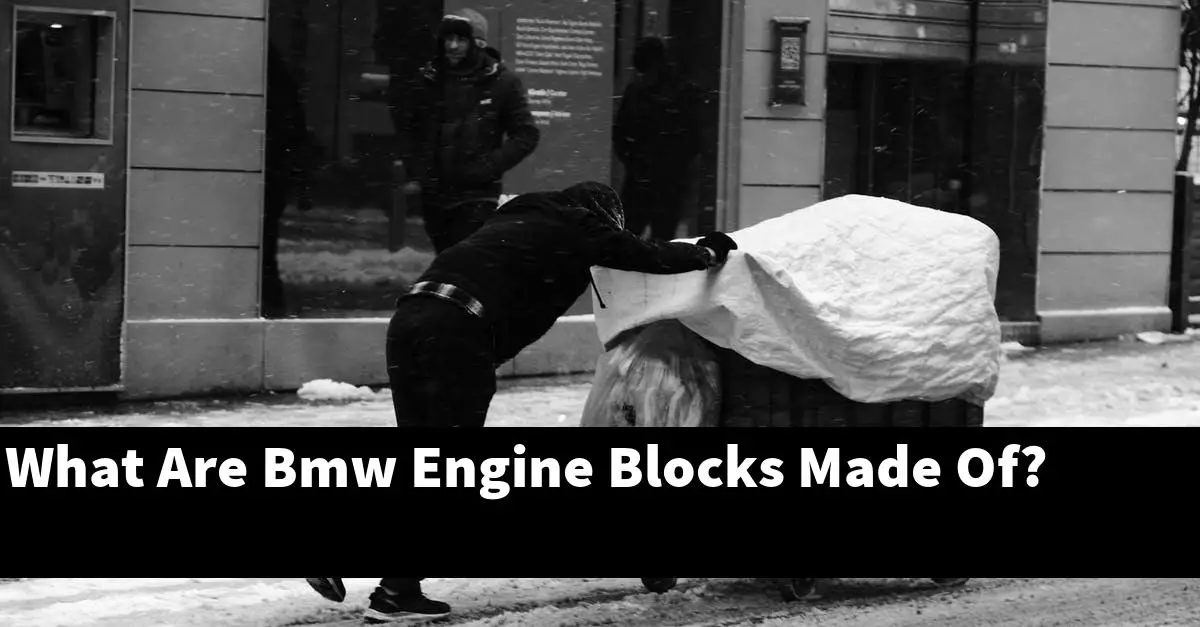BMW engine blocks are made of cast iron. The company has been using this material for over 100 years and it is still the best choice for engine blocks.
BMW has developed a special process for casting engine blocks that results in a product that is stronger and lighter than traditional cast iron blocks.
What is the best material for engine block?
There are a variety of materials that can be used for engine block, depending on the specific application. Engine blocks made from cast iron are the most durable and are often used in racing engines.
They are also the most expensive to manufacture. Blocks made from aluminum are generally lighter and more resistant to heat and wear, but they don’t last as long.
Blocks made from steel are the least expensive to produce, but they don’t have the strength or durability of cast iron or aluminum.
What are engine blocks made of?
Engine blocks are made of cast iron and are the foundation of a car or truck. Cast iron is one of the strongest materials used in the manufacture of engines and the block is also the foundation of the engine’s crankshaft.
The block and crankshaft are connected by a series of bolts that hold the two parts together. The block also contains the engine’s pistons, valves, and sensors.
Are BMW engines aluminum?
BMW engines are made of aluminum alloys. Aluminum is a lightweight metal that is strong yet lightweight, making it an ideal material for engine construction.
The aluminum alloy used in BMW engines is a special type called an alloy that is 50% aluminum and 50% nickel. The alloy results in a strong engine with excellent heat resistance.
The nickel also helps to reduce friction, which results in a longer engine life.
What is an engine block made of?
An engine block is made of a cast iron or aluminum alloy. The block is the foundation of a car or truck engine.
It contains the engine’s cylinders, valves, and fuel and air filters. The block also supports the engine’s crankcase, which holds the engine’s oil and other fluids.
What is n52 block made of?
The n52 block is made of a nickel-chromium-molybdenum alloy. The alloy is heated until it reaches a temperature of about 2,700 degrees Fahrenheit.
This creates a solidified gas called a plasma. The plasma is then cut into small pieces and heated until it reaches a temperature of about 4,700 degrees Fahrenheit.
This creates a solidified metal called a carbide.
What material is best for an engine block?
Choosing the correct engine block material is an important decision for engine builders. Engine blocks are typically made from a variety of materials, but there are a few key factors to consider when selecting one.
One of the most important factors is the weight of the engine block. The heavier the block, the more stable it will be.
Additionally, the heavier the block, the more durable it will be.
Another important factor is the material’s ability to withstand heat and stress. Engine blocks are typically made from a variety of materials, but some are better suited for certain tasks than others.
For example, aluminum blocks are often used for engine blocks because they are lightweight and have a high heat tolerance.
Another important factor to consider is the material’s cost. Engine blocks are typically expensive, so it is important to choose the best material for the job.
What is sand casting engine blocks?
Sand casting is a process where molten metal is poured into a mold and allowed to cool and solidify. This creates a hollowed out piece of metal that can then be used for a variety of purposes.
One of these purposes is engine block casting.
Engine block casting is a process where a block of metal is cast in a mold. This block is designed to be used as the main component of an engine.
The block is first designed using CAD software. This software helps designers to create a 3D model of the engine block.
The model is then used to create a mold. This mold is used to create a series of identical copies of the engine block.
The process of engine block casting is quite complex. First, the mold is created using a special type of metal.
This metal is known as sand castable metal. The mold is then filled with a mixture of sand and metal.
The mixture is then poured into the mold and allowed to cool. Once the mixture has cooled, the engine block is cast out of it.
The engine block is a very important part of a engine. It is responsible for transferring the power from the engine to the wheels.
If the engine block is not of the highest quality, then the performance of the engine will be impacted.
Engine block casting is a process that is used to create high-quality engine blocks. This process is used to create engine blocks that are perfect for use in a variety of different types of engines.
What is an en bloc v6 engine?
An en bloc v6 engine is a 6-cylinder engine that is packaged in a single block. The engine is usually mounted in the rear of a vehicle, and it is designed for use in medium to heavy trucks and SUVs.
Conclusion
The engine block of a BMW is made of cast iron. This material is chosen for its high strength and durability.
The engine block is the foundation of the engine, so it must be able to withstand high levels of stress and heat.


